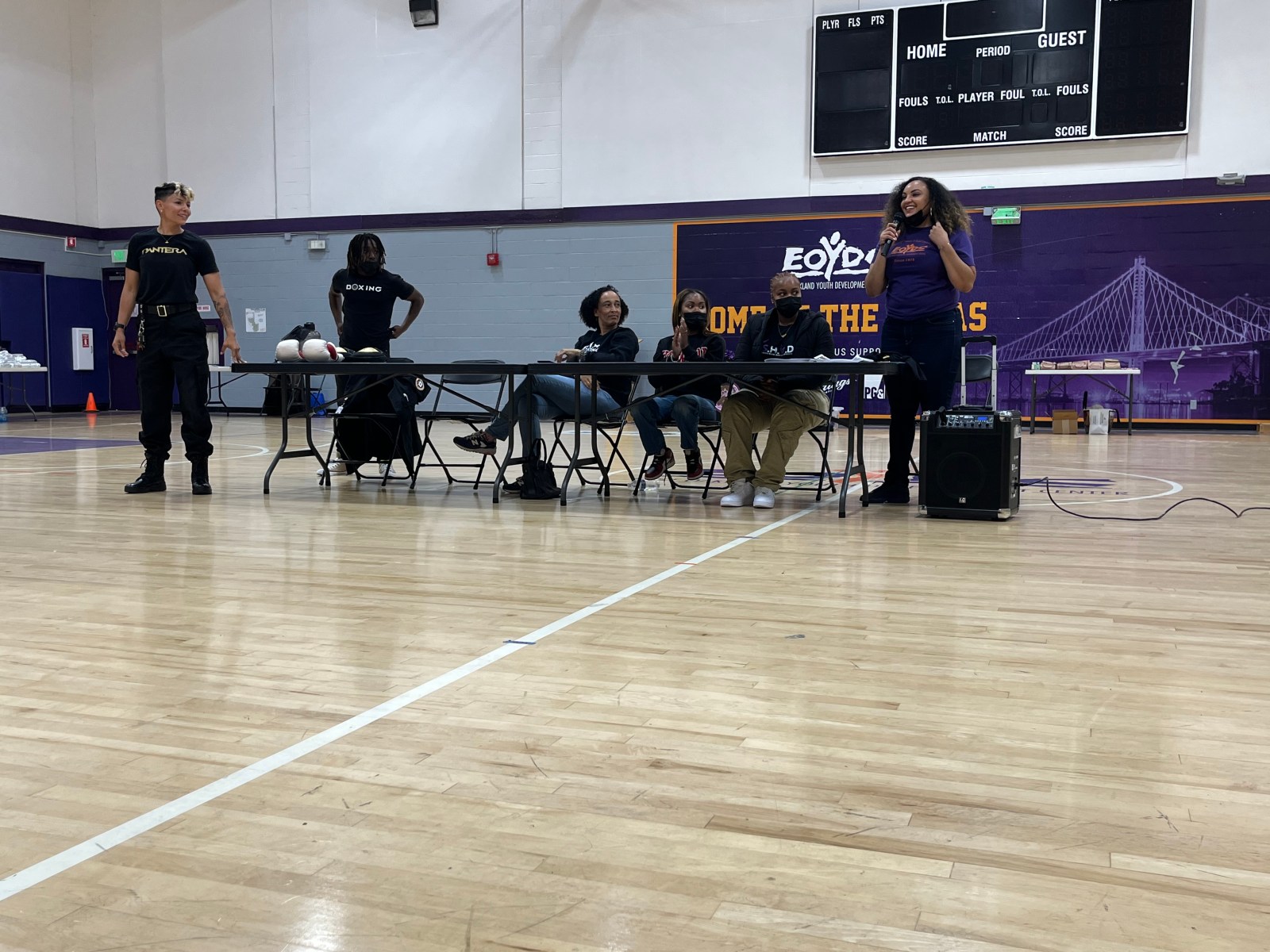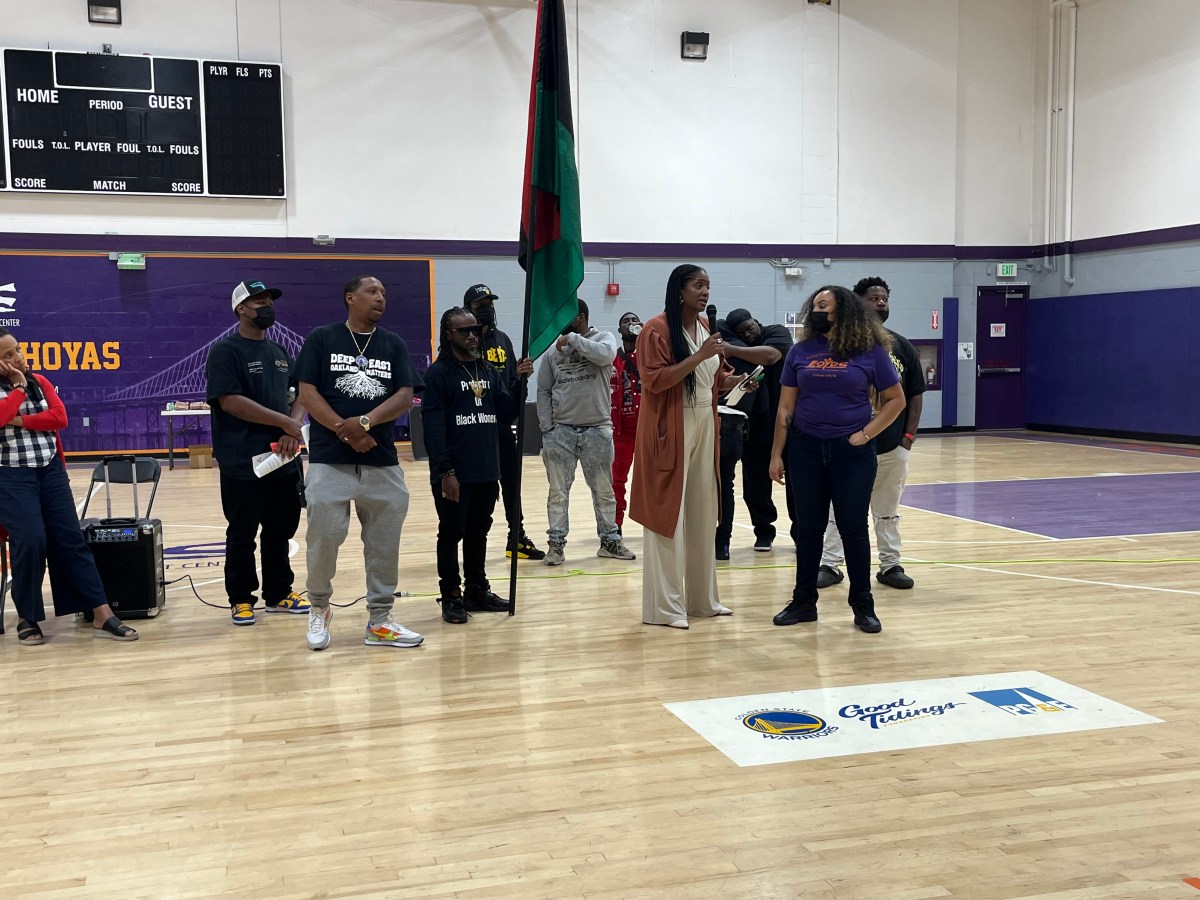Dozens of people attended a community meeting on public safety organized with District 7 Councilmember Treva Reid at the East Oakland Youth Development Center on Thursday. Reid and others called for the meeting following what they say is a recent increase in abductions targeting Black girls and women.
According to Reid’s office, Black people accounted for over 50% of missing person cases in Oakland last year, even though they only make up 22% of the city’s population.
“That should be alarming and outrageous for every Oaklander,” Reid said at the meeting. Others in attendance said they believe many of these crimes haven’t been reported to the Oakland Police Department.
It’s not clear, based on OPD statistics, that there’s been any recent increase in attempted kidnappings; the police could not immediately provide The Oaklandside with a breakdown of abduction statistics for Oakland. But human trafficking, particularly for purposes of sexual exploitation, has been a problem in Oakland for decades. Sexual assaults have also increased 25% this year, according to OPD data.
Selena Wilson, executive director of the East Oakland Youth Development Center, told The Oaklandside this week’s meeting was organized after 10 abductions or attempted kidnappings occurred within the span of a week.
The City Council recently approved a resolution that Reid introduced to support a bill written by southern California state Senator Steven Bradford to create an “Ebony Alert,” which would function like the Amber Alert for missing children, but for Black youth who are missing under unexplained or suspicious circumstances. Reid said Black women and girls are disproportionately affected by human trafficking, but law enforcement agencies are more likely to classify them as “runaways” compared to missing white people.
Thursday’s meeting was the fourth safety town hall held over the past couple of weeks in Oakland.
A meeting held on Tuesday in North Oakland was attended by a mostly white audience concerned about robberies and assaults. Many community members who showed up demanded more police in their neighborhoods and harsher punishments for violators. Last week, Fruitvale merchants, many of them Latino, voiced their concerns amid an increase in shootings in their neighborhood and also asked for more police. And two weeks ago, Lakeshore residents, also mostly white, packed the Lakeshore Avenue Baptist Church, calling for greater police presence following a string of robberies and a shooting that resulted in the injury of a toddler.

Thursday’s East Oakland forum was attended mostly by Black residents and the conversation mostly focused on community-oriented safety approaches.
Wilson said a man recently stalked and tried to grab a girl who is employed by the center. The girl, who had noticed and photographed the man when he started taking pictures of her, escaped by swinging a metal water bottle at him.
“I want to emphasize as much as I possibly can, it is so important that we teach our girls basic self-defense tactics,” Wilson said.
Dalia Gomez, the founder of Vertical Skillz Outreach, encouraged children to learn boxing to defend themselves from predators. She also urged girls to keep constant vigilance on the streets and confined spaces, such as elevators.
“If it’s me and another guy, I literally walk in and I face him,” Gomez said. “If you have earpods in or you’re looking at your phone, it’s no good—you should be able to hear somebody at least 10 feet away from you.”
Nola Brantley, a co-founder of the nonprofit MISSSEY who has worked extensively with sexually exploited youth, said parents should monitor their kids’ activities online and in the world. That could include tracking their phones and placing electronic tags in their school bags. Brantley said it’s especially important for parents to learn what their kids are doing on social media.
“Lots of perpetrators meet their victims online,” Brantley said. “Since 2015, over half of the kids that have been sex-trafficked met their recruiter or trafficker online. It’s a huge deal.”
Several younger people at Thursday’s meeting talked about the careful steps they take each day to avoid running into danger when they leave their homes. Alyce Karim said she has recently stopped walking anywhere—including to the youth center—because she has to travel along a section of International Boulevard, which is dangerous.
“I feel very vulnerable to violence in Oakland,” said Karim.
Meeting attendees said they want to see more action from the city to address violence and trafficking in East Oakland. Some of them raised these concerns with the City Council earlier this week during a study session to talk about Mayor Sheng Thao’s proposed budget for 2023-2025.
During that meeting, dozens of organizers and residents asked the council not to cut the Department of Violence Prevention, which was established in 2017. The department contracts with community organizations that employ life coaches and outreach workers to help break cycles of violence and trauma in the community. Some groups also work to address sexual exploitation and gender-based forms of violence. The department’s nonprofit partners face 22% funding cuts across the board, which could jeopardize their ability to serve thousands of residents.
Daryle Allums Sr. said his organization, Adamika Village, is one of the department’s grantees. His group does violence interruption work and provides resources for victim’s families. He said the department’s funds are critical because it helps people in the community help each other.
“It’s about our people taking care of our own people,” Allums said.
Thao’s budget proposal would slightly grow OPD’s budget but freeze unfilled officer positions and slash overtime, which would result in police service reductions. She’s also proposing cuts to the Department of Violence Prevention but emphasizing support for non-police programs like the Mobile Assistance Community Responders of Oakland (MACRO). Thao, who is a survivor of domestic violence, also recently launched an advisory council to develop strategies for reducing human and sex trafficking in Oakland.
Sarai Smith-Mazariegos, executive director of S.H.A.D.E. Movement, Inc., an organization that helps survivors of human trafficking and domestic violence, said policymakers need to do far more to help Black girls and women in Oakland.
“As a survivor, I understand what it feels like to be harassed, to be followed, to be locked up somewhere and told you can’t leave. To be told, ‘this is what you’re going to do,’ because you got to make a quota tonight,” Smith-Mazariegos said, slamming her hands on a table for emphasis, fury building in her voice. “Can we do better as a community, as a city, as Alameda County? Can we do better?”

